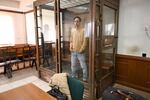
U.S. journalist Evan Gershkovich looks out from inside a defendants' cage before a hearing to consider an appeal on his extended pretrial detention, at the Moscow City Court in Moscow, on Feb. 20.
Natalia Kolesnikova / AFP via Getty Images
Friday marks one year since Wall Street Journal reporter Evan Gershkovich was detained by Russian security forces on spying allegations — the first such detention of an American journalist on espionage charges in Russia since the latter days of the Cold War.
The Journal — which vehemently rejects the charges — observed the somber anniversary with an #IStandWithEvan tribute.
Family, friends and journalists across the media landscape took part in a marathon reading of Gershkovich's articles — penetrating vignettes of contemporary Russia that highlighted his deep knowledge of the country, its politics and its people.
Gershkovich, 32, the son of Russian Jewish émigrés who was born and raised in New Jersey, had grown up in a dual-language household absorbing American and Russian cartoons, books and pop culture.
Whether that background, his sharp reporter's eye or something else may have played a role in his arrest remains unclear.
What is certain is that his detention is yet another irritant in U.S.-Russian relations already at Cold War-like lows following the Kremlin's full-scale invasion of Ukraine in February 2022. The Biden administration has said securing Gershkovich's freedom is a priority.
His arrest has only further highlighted Western suspicion of a growing pattern of "hostage diplomacy" in Moscow — one in which Russian authorities are accused of ensnaring Americans on spurious legal charges to see what deals emerge.
A journalist detained
Gershkovich was on a reporting assignment in Russia's Ural mountain city of Yekaterinburg in March of last year when he was detained by agents from Russia's Federal Security Service, the FSB, at a downtown steakhouse.
Witnesses at the Bukowski Grill reportedly had little time to even see who was the target when government agents suddenly stormed the restaurant. Within seconds, they had pulled Gershkovich's sweater over his head and frog-marched him out into an unmarked van.
The next day, Gershkovich reappeared in a Moscow court and was formally charged with trying to obtain state secrets — a penalty for which he faces up to 20 years in jail if convicted.
A journalist, not a spy
Gershkovich and the Journal immediately rejected the spying allegations, saying Gershkovich was working in Russia with official press accreditation from the Foreign Ministry.
In fact, he'd been reporting on the country since 2017 — initially for The Moscow Times and then the Agence France-Presse (AFP) before taking a job with the Journal in 2022. His credentials had been subject to repeat security reviews by the Russian government.
Yet none of that appeared to matter. The Russian government insisted Gershkovich was guilty of the espionage charges — without providing any evidence. Instead, they saw his journalist status as possible proof of his guilt.

Journalists watch a TV screen broadcasting a hearing on Wall Street Journal reporter Evan Gershkovich's case from a courtroom at the Moscow City Court on April 18, 2023.
Alexander Zemlianichenko / AP
"Unfortunately, it's not the first occasion when the status of a 'foreign correspondent,' a journalist visa and accreditation have been used by foreigners in our country to cover up activities that aren't journalism," Foreign Ministry spokesperson Maria Zakharova wrote on social media shortly after Gershkovich's arrest.
"It's not the first famous Westerner we've caught red-handed."
The U.S. government moved quickly to label Gershkovich "wrongfully detained" — a designation that makes him a hostage in the eyes of the U.S. government.
Cold War replay
Gershkovich's arrest echoed Moscow's detention of another American reporter — decades prior and, seemingly, in a different era.
In 1986, Nicholas Daniloff, a correspondent with U.S. News & World Report, was arrested in a KGB sting operation in Moscow. Like Gershkovich, Daniloff was of Russian heritage. He and his publication, too, rejected the charges as a sham.
The American spent 14 days in Moscow's Lefortovo Prison before negotiations between President Ronald Reagan and Soviet Premier Mikhail Gorbachev — then the USSR's new reform-minded leader — cut a deal to set him free.
"Time in Lefortovo was mental torture," Daniloff wrote in an article later, recalling his repeat sessions with a KGB interrogator.
"He played with my emotions, posing alternatively as a 'good cop' and a 'bad cop.' He controlled all information that reached me. He controlled my food, my exercise, my life. [By] the time I was freed, he had made me feel guilt where there was none."
There are also Daniloff's accounts of conditions in a cell "measured five-paces long, three-paces wide."

U.S. reporter Nicholas Daniloff after his release from being detained in Russia.
Cynthia Johnson / Getty Images
"There were three steel cots painted blue, a small table for each prisoner, a washbowl and primitive toilet with a wooden cover just high enough to be uncomfortable. The place was clean, but there was a distinctive smell," Daniloff wrote.
Nearly four decades later, recent prisoners say little has changed.
Life on hold
The past year has seen a continuous loop of closed-court hearings in which judges have extended Gershkovich's pretrial detention time and again.
The judges have rejected cash bail offers by the Journal's parent company, Dow Jones. They have also denied appeals to move him to house arrest pending a trial, whose date never seems to come.
Yet Gershkovich's family and friends say he remains strong — with his letters full of his trademark optimism and humor.
"We currently have a joke going back and forth about this framed photo of him," his sister, Danielle Gershkovich, said in an interview with NPR's All Things Considered last October.
"And I'm joking about where I should put it in the apartment, and he recently suggested, put it directly in front of the TV so you can see his face," she said.
Evan Gershkovich has also taken advantage of one of Lefortovo's few benefits: a decent library collection of Russian classics by the likes of Leo Tolstoy, Fyodor Dostoevsky and other literary giants.
"He's read a lot of books. And he told us maybe he will write some good novel at the end of this story, about himself," his Russian lawyer Tatiana Nozhkina told NPR following a hearing last April.
But there's no denying the slow grind of a year spent awaiting trial with no immediate court date in sight.

The Independent Association of Publishers' Employees and Wall Street Journal journalists rally in Washington, D.C., on April 12, 2023, calling for the release of reporter Evan Gershkovich, who has been held in Russia since March 29, 2023.
Andrew Caballero-Reynolds / AFP via Getty Images
This week, a judge extended his detention by another three months — until late June. Again, no indication of when Gershkovich might expect trial.
U.S. Ambassador to Russia Lynne Tracy called the latest ruling "particularly painful" — noting the journalist had spent a year awaiting charges that were "fiction" from the outset.
"Evan's case is not about evidence, due process, or rule of law. It is about using American citizens as pawns to achieve political ends," the ambassador said in a statement Tuesday.
Tracy specifically pointed to the case of Paul Whelan, another American the U.S. has designated "wrongfully detained."
But there are others languishing in Russian prisons, including Alsu Kurmasheva, a Russian American journalist with the U.S.-government funded Radio Free Europe/Radio Liberty news service, and Marc Fogel, an American schoolteacher.
Prisoner trade rumors
If there's an upside amid the current situation, it's that prisoner exchanges between Moscow and Washington remain possible despite current hostilities.
Trevor Reed, a former Marine who says he was wrongly convicted of assaulting a Russian police officer, was released by Russia in April 2022.
Brittney Griner, a WNBA basketball star sentenced to nine years on drug possession, was freed later that same year.
In each case, the price was steep: The Biden administration released Viktor Bout, a convicted arms dealer, for Griner. Reed was traded for Konstantin Yaroshenko, a pilot convicted of narcotics smuggling.
White House officials defended the moves as difficult — but necessary — decisions.
Detractors argued the trades merely encouraged more detentions. Perhaps even that of a Wall Street Journal reporter.
Either way, few, including the U.S. government, expect much from a Russian justice system in which over 99% of all criminal cases end in conviction.
And so the Biden administration says it continues to make offers aimed at securing the release of Gershkovich and others.

Evan Gershkovich stands inside a defendants' cage before a hearing to consider an appeal on his extended pretrial detention at the Moscow City Court on Sept. 19, 2023.
Natalia Kolesnikova / AFP via Getty Images
In turn, Russian President Vladimir Putin has indicated Moscow is open to a swap provided circumstances are right.
Asked about the Gershkovich case in a February interview with former Fox News host Tucker Carlson, Putin was even more explicit. The Russian leader strongly suggested he would be willing to trade Gershkovich for Vadim Krasikov, a suspected FSB assassin currently serving a life sentence for murder in Germany.
Further muddying the picture: Multiple news reports allege that German authorities had tied Krasikov's potential release to the Kremlin leader agreeing to free the jailed Russian opposition leader Alexei Navalny.
Neither U.S. nor German officials have verified those accounts. And Navalny died under still unexplained circumstances in a remote Arctic prison last month, making any potential deal impossible.
In the meantime, Gershkovich remains in Lefortovo prison, reading, writing, waiting — his story like one he himself would report on in ordinary times.
"Evan has displayed remarkable resilience and strength in the face of this grim situation," said Ambassador Tracy in her statement this week.
"But it is time for the Russian government to let Evan go."
Copyright 2024 NPR. To see more, visit https://www.npr.org.